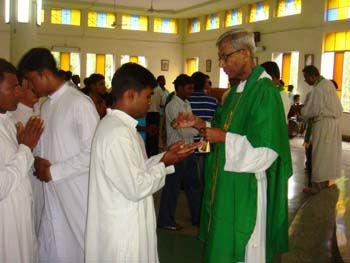|
A Water Purification System for a Seminary in India Project Code: 317-02-19 Thanks to our benefactors, this project in support of future priests has been completed. "Morning Star Seminary" – this is the poetic name of the Catholic seminary in Barrackpore in West Bengal. It owes its beautiful name to the Virgin Mary, who is sometimes given this title. It is here that some 200 young men from 30 different Indian dioceses and six different religious congregations are training for the priesthood. Although they belong to a whole range of different ethnic groups, they are like one big family. Here the seminarians are prepared for the many different challenges they will eventually face as Catholic priests in India. For this is a country of vastly differing cultures, religions and languages, all coexisting alongside one another. As a result, future priests not only need to have a solid theological and spiritual formation but must also be ready to understand the people and their various different traditions at an immediate, human level. In addition to English and their own mother tongue, they must also learn to master other languages spoken in India, in order to be able to communicate with and listen to the people among whom they will work and minister. Another facet of their education includes an understanding of the modern means of communication, so that the Church can also bring the Good News to people by these means as well. On the other hand, great emphasis is laid in the seminary on a simple, modest lifestyle. Also important is a sense of social commitment. Once a week these young men visit an old people's home, a leprosy station or a hospital, where they learn to serve Christ in the sick and lonely, to comfort them and come to know and share in their suffering first hand. Many of these future priests will be sent to remote regions in northern and northeast India, where Catholics of the ethnic minority groups await their ministry with longing. Living conditions are particularly hard in these areas, however, and so the seminarians are already being encouraged during their training to accustom themselves to physical work in the fields and in the houses. The seminary has its own agricultural holdings, with rice fields, and the students are expected to clean and maintain the seminary building themselves. The rector, Father Franklin Menendez, wrote to ACN as follows: "The seminarians have to learn to experience for themselves the painful situations of poverty, injustice and illiteracy that are so widespread in the region. The seminary is forming missionary priests who will be capable of bringing Christ to the local communities by adapting themselves to the local lifestyle and living in a manner that accords with that of the people themselves." At the same time, however, it is important for these future Indian priests to have a good understanding of other religions and be able to engage in a respectful and fruitful dialogue with their followers and leaders. Since India today repeatedly experiences outbreaks of anti-Christian violence and violent attacks on Christians, their efforts can perhaps help to promote peaceful coexistence in society. One serious practical problem the seminary faced was the quality of its drinking water, which was very poor, so that many of the seminarians were suffering from illness due to the unclean water. Some were even complaining of hair falling out, since the water contained not only bacteria but also harmful chemicals. Hence there was an urgent need for a water purification system before any further damage was done to the health of these candidates for the priesthood. Thanks to the generosity of our benefactors, ACN was able to provide a subsidy of $9,700 to help ensure the health of these future priests. This now completed project is an example of our work. If you would like to support a similar project, then please indicate the reference code below when making your donation. Thank you. |
|
|

